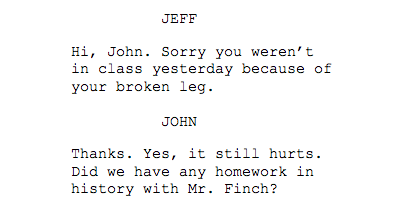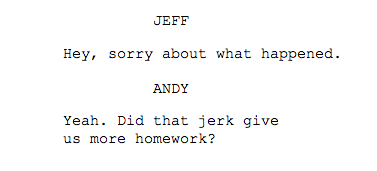No matter what you’ve heard, there is no magic formula to writing a screenplay. There are, however, guidelines that can make your life much easier when you set out to write your script. These 4 tips are good rules of thumb to remember.
1. A story needs CONFLICT.
What do movies like The Hunger Games, Finding Nemo, Alien. . . all have in common? From science fiction to animation, what common link could they possibly share? You guessed it, conflict!
Imagine. . . Bill and Jane are friends who get along really well. The end. Who wants to see that? Boooring. Now, Bill and Jane are friends, but Bill finds out that Jane is really an alien who is planning to take over the world. Now you’ve got a story! It’s all about creating a problem. Invent a character, then throw problems at him or her. Remember, no story can exist without conflict.
2. It’s a good idea to know the ending before you start writing.
It’s been said that you can write a novel without knowing how it will end. Screenplays, on the other hand, are entirely different. There are usually three acts—a beginning, middle and an end. Your screenplay must be no more than 120 pages (a minute of screen time per page) to be a two-hour feature film. For this reason, you have to know where your story is going in order to get there in a short amount of time.
In your script, you’ll want to write “set-ups,” which are clues that lead your audience toward the destination, or the end.
I’ve tried to write some scripts without knowing the end. Be warned—what you end up with is a lot of rewriting. It’s possible to go back and try to fix everything. But trust me, it’s usually a big mess. Do yourself a favor—know the ending!
3. Never forget that CHARACTERS move the story.
Whether your story is a drama or action flick, every decision you make about what happens next should make sense for your characters.
If you, the writer, need your main character to go on an adventure, make sure he either loves adventure or has a good reason to go. In the first Star Wars, Luke Skywalker is content to live on Tatooine and be a spaceship mechanic. He may not like the Evil Empire, but it wouldn’t make sense for him to wake up one day and decide to fight. No audience is going to believe that. Instead, Luke loses his family and his house—all tragically destroyed by the Evil Empire. This gives him a) a motivation to fight, and b) he has nothing left on his planet to make him stay there.
So before your characters do anything, ask yourself why they’re doing it. Then your story will feel real.
4. When you write dialogue, listen to how people really talk.
Here’s a typical scene between two teenage boys that could be written by a beginning screenwriter:
Next, you may have heard the phrase “show, don’t tell.” Instead of having a character explain something, show the audience instead. To know that John broke his leg, all we need to see is a cast on John’s leg. And, if Jeff already knows that John broke his leg, he’d never say, “because of your broken leg.” He’s also not likely going to say his name.
Also, why is John being so specific about history class and who the teacher is? Two boys who have the same class already know what it is. The scene could read something like this:
When you set out to write your screenplay, you’ll get all kinds of advice. Remember, there isn’t a magic formula. Be creative, follow some of these guidelines, and it will help to make your screenplay the best it can be. Good luck and keep writing!





 RSS Feed
RSS Feed
